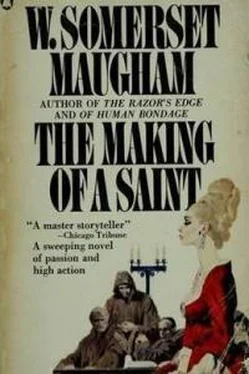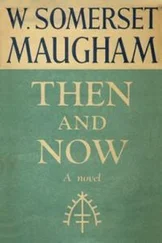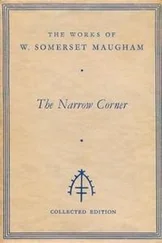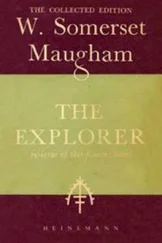The piazza was thronged, and every moment people entered; the women of the lower classes had come, joining their shrill cries to the shouts of the men. The noise was stupendous, and above all rang the cries of Liberty and Death.
'The Countess! The Countess!'
It became the general cry, drowning the others, and from all quarters.
'Where is the Countess? Bring her out. Death to the Countess!'
A cry went up that she was in the Palace, and the shout became,—
'To the Palace! To the Palace!'
Checco said to us,—
'We must save her. If they get hold of her she will be torn to pieces. Let her be taken to my house.'
Matteo and Pansecchi took all the soldiers they could and entered the Palace. In a few minutes they appeared with Caterina and her children; they had surrounded her and were walking with drawn swords.
A yell broke from these thousands of throats, and they surged towards the little band. Checco shouted out to them to let her go in peace, and they held back a little; but as she passed they hissed and cursed and called her foul names. Caterina walked proudly, neither turning to the right nor to the left, no sign of terror on her face, not even a pallid cheek. She might have been traversing the piazza amidst the homage of her people. Suddenly it occurred to a man that she had jewels concealed on her. He pushed through the guards and put his hand to her bosom. She lifted her hand and hit him in the face. A cry of rage broke from the populace, and they made a rush. Matteo and his men stopped, closing together, and he said,—
'By God! I swear I will kill any man who comes within my reach.'
They shrank back frightened, and taking advantage of this, the little band hurried out of the piazza.
Then the people looked at one another, waiting for something to do, not knowing where to begin. Their eyes were beginning to flame, and their hands to itch for destruction. Checco saw their feeling, and at once pointed to the Palace.
'There are the fruits of your labours, your money, your jewels, your taxes. Go and take back your own. There is the Palace. We give you the Palace.'
They broke into a cheer, a rush was made, and they struggled in by the great doors, fighting their way up the stairs in search of plunder, dispersing through the splendid rooms….
Checco looked at them disappearing through the gateway.
'Now, we have them at last.'
In a few minutes the stream at the Palace gates became double, for it consisted of those coming out as well as of those going in. The confusion became greater and greater, and the rival bands elbowed and struggled and fought. The windows were burst open and things thrown out—coverlets, linen, curtains, gorgeous silks, Oriental brocades, satins—and the women stood below to catch them. Sometimes there was a struggle for possession, but the objects were poured out so fast that everyone could be satisfied. Through the doors men could be seen coming with their arms full, their pockets bulging, and handing their plunder to their wives to take home, while they themselves rushed in again. All the little things were taken first, and then it was the turn of the furniture. People came out with chairs or coffers on their heads, bearing them away quickly lest their claim should be disputed. Sometimes the entrance was stopped by two or three men coming out with a heavy chest or with the pieces of a bedstead. Then the shouting and pushing and confusion were worse than ever…. Even the furniture gave out under the keen hands, and looking round they saw that the walls and floors were bare. But there was still something for them. They made for the doors and wrenched them away. From the piazza we saw men tear out the window frames, even the hinges were taken, and they streamed out of the Palace heavily laden, their hands bloody from the work of destruction.
All over the town the bells were ringing, and still people surged into the piazza. Thousands had got nothing from the Palace, and they cried out in anger against their companions, envious at their good luck. Bands had formed themselves with chiefs, and they were going about exciting the others. Checco stood among them, unable to restrain them. Suddenly another cry rose from a thousand throats,—
'The Treasury!'
And irresistible as the sea, they rushed to the Gabella. In a few minutes the same ruin had overtaken it, and it was lying bare and empty.
Scarcely one of them remained in the piazza. The corpse was lying on the cold stones, naked, the face close to the house in which the living man had taken such pride; and the house itself, with the gaping apertures from the stolen windows, looked like a building which had been burnt with fire, so that only the walls remained. And it was empty but for a few rapacious men, who were wandering about like scavengers to see whether anything had been left unfound.
The body had done its work and it could rest in peace. Checco sent for friars, who placed it on a stretcher, covering its nakedness, and bore it to their church.
Night came, and with it a little peace. The tumult with which the town was filled quietened down; one by one the sounds ceased, and over the city fell a troubled sleep….
We were up betimes. The town was ours, except the citadel. Checco had gone to the fortress, which stood above the town, to one side, and had summoned the Castellan to surrender. He had refused, as we expected; but we were not much troubled, for we had Caterina and her children in our power, and by their means thought we could get hold of the castle.
Checco had called a meeting of the Council to decide what should be done with the town. It was purely a measure of politeness, for he had already made up his mind and taken steps in accordance. With the town so troubled, the citadel still in our opponent's hands, and the armies of Lodovico Moro at Milan, it was hopeless to suggest standing alone; and Checco had decided to offer Forli to the Pope. This would give a protection against external enemies and would not greatly interfere with the internal relations. The real power would belong to the chief citizen, and Checco knew well enough whom that was. Further, the lax grasp of the Pope would soon be loosed by death, and in the confusion of a long conclave and a change of rulers, it would not be impossible to change the state of dependence into real liberty, and for Checco to add the rights and titles of lordship to the power. On the previous night he had sent a messenger to the Protonotary Savello, the papal governor of Cesena, with an account of what had happened and the offer of the town. Checco had requested an immediate reply, and was expecting it every minute.
The Council was called for ten o'clock. At nine Checco received Savello's secret consent.
The President of the Council was Niccolo Tornielli, and he opened the sitting by reminding his hearers of their object, and calling for their opinions. At first no one would speak. They did not know what was in Checco's mind, and they had no wish to say anything that might be offensive to him. The Forlivesi are a cautious race! After a while an old man got up and timidly expressed the thanks of the citizens for the freedom which Checco had bestowed upon them, suggesting also that he should speak first. The lead thus given, the worthies rose, one after another, and said the same things with an air of profound originality.
Then Antonio Sassi stood up. It was he who had advised Girolamo to impose the taxes on the town; and he was known to be a deadly enemy of Checco. The others had been sufficiently astonished when they saw him enter the Council chamber, for it was thought that he had left the town, as Ercole Piacentini and others of the Count's favourites had done. When he prepared to speak, the surprise was universal.
'Our good friend, Niccolo,' he said, 'has called upon us to decide what shall be done with the town.
Читать дальше











